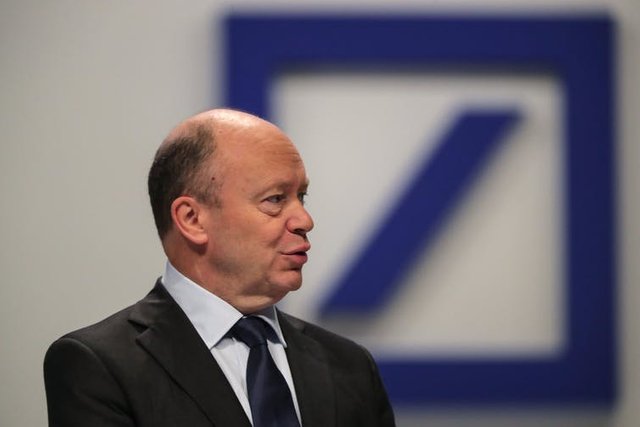Banking sector will be ground zero for job losses from AI and robotics
Deutsche Bank CEO John Cryan has predicted a bonfire of industry jobs as automation takes hold across the finance sector. Every signal is that he will be proved right very soon.
Those roles in finance where the knowledge required is systematic will soon disappear. And it will happen irrespective of how high a level, how highly trained or how experienced the human equivalent may currently be. Regular and repetitive tasks at all levels of an organisation already do not need to be done by humans. The more a job is solely or largely composed of these routines the higher the risk of being replaced by computing power.
The warning signs have been out there for a number of years as enthusiastic reports about artificial intelligence have been tempered with fears about significant job losses in most sectors of the economy.
Many roles have already all but disappeared in the march towards a fully digital economy. Older readers may recall typesetters, typists, and increasingly, switchboard operators and back room postal workers, as work of the last century. And the changing nature of work is relentless.
Banking on jobs
The finance sector was once driven by human judgement and decision making. But slowly, it has changed. One-to-one conversations with your local bank manager were replaced by scripted call centre interactions during the 1990s. Today, increased processing power, massive cloud storage, strong encryption and an increase in the use of blockchain make possible tasks that had previously been seen as too complex for automation to be done quickly and consistently without any human intervention.
Artificial intelligence reduces the need for human work that requires analysis, consistent applications of decisions and judgement calls. These are pivotal actions for many legal and financial activities. Combined, in the background, with blockchain – essentially a publicly shared automated ledger of agreed contracts – arrangements that require some form of trust between two parties will also be able to be completed with little or no human intervention.
Blockchain is the basis of every cryptocurrency – forms of money exchanged online. Banks are slowly working towards ways of embracing these alternative systems. While alternative forms of money attract popular headlines it is the automation behind the scenes that is most compelling aspect for the finance sector. By removing the influence of human decision making from as many processes as possible, a fully digital supply chain can be created. As artificial intelligence learns more about the impact and influence of every process each time it happens, a bank’s efficiency should continuously improve, and profits increase, with fewer and fewer employees.
Protected
In this atmosphere of change to the world of work in banking, however, there are some roles that will prove more resistant to change. Work that is unpredictable or inherently people-focused will survive. Customer service staff will still need to tackle the inevitably complex queries that are the product of the human mind rather than the outcome of algorithms. AI will deal with most enquiries, but will inevitably need to transfer the most cryptic to a human interlocutor. Mortgage decisions, for example, will come as an automatically generated message; more intricate questions will still require face-to-face conversations.
At the other end of the (pay) scale senior executives will continue to steer the direction of their individual organisations, although the nature of their work will subtly change to become technology-based decisions. Executives will find themselves choosing an algorithm instead of directly making a high-risk investment decision, or they may end up selecting an artificial intelligence machine rather than interviewing people to become employees. Reduction in the wage bill at other levels of the business and the increasing significance of the few human decisions that need to be made may even assist in justifying their annual bonuses.
Inevitable change
The traditional banking sector is an obvious area for artificial intelligence and automation to generate competitive advantages for companies. This is a result, in part, of previous reluctance to embrace change. In the late 1990s there was a collective hysteria around the Y2K bug and fear of a wholesale shutdown of computers which failed to cope with the millennium date change. That highlighted the sector’s uneasy relationship with fast-moving technological change. But even this public panic prompted few immediate, practical changes.
Now, mobile app-only banks, with no branches, such as N26 and Monzo, challenge the traditional banking sector and its human resources legacy. Traditional banks are still largely oriented towards humans doing most of its work. In 2016, over 1m people, or 3.1% of the UK workforce, were employed in the finance services sector, which is the biggest tax contributor to the UK economy and the country’s largest exporter. Most predictions claim around 50% of the jobs in the sector will be lost. Depending on who you listen to, this process will take between five and 20 years.
The impact of these changes will be felt across the entire economy. There exists a genuine fear that artificial intelligence, robotics and fully digital businesses may contribute to a significant increase in the gap between rich and poor.
Deutsche Bank’s CEO is being frank about a future where jobs in banking and elsewhere will become ever more scarce as digital business becomes a reality. This realisation has reinvigorated calls for a universal basic income (UBI) or a social dividend in the UK and elsewhere. The proposal has found support with some MEPs as a means to maintain personal levels of prosperity in this new world. Crucially too, the UBI would seek to maintain the foundations of the current Western economy in an era of increasingly fully automated digital businesses – a goal, if achieved, which might also just about keep the current finance and banking sector in business.
I enjoyed your article. The finance sector is changing quick with fintech and blockchain. Even these relatively new fields are evolving rapidly to become a disruptive technology rather than a collaborative one as it exists now. AI and robots will be introduced in a similar way. We will program it to collaborate with us. In your example about AI making high-risk investment decisions instead of the CEO I had to disagree a little. It's my fear that AI will be a ugly mirror version of ourselves making decisions based on only what is the most profitable and how to get away with it. AI would have access to big databases that wouldn't be available to CEO's because humans don't collect data as much as we experience events. My hope is that compassion for others and a solid moral bearing is better achieved in AI than in humans if it is to become a disruptive technology in the future. Resteemed and followed!
Congratulations @swapna! You have completed some achievement on Steemit and have been rewarded with new badge(s) :
Click on any badge to view your own Board of Honor on SteemitBoard.
For more information about SteemitBoard, click here
If you no longer want to receive notifications, reply to this comment with the word
STOP